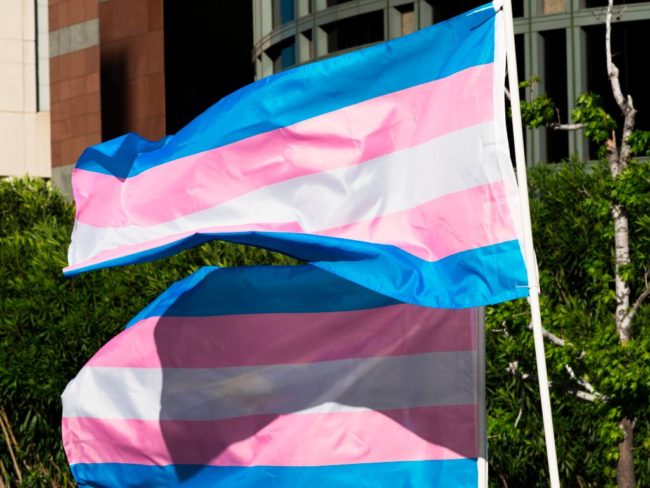Trans woman in Australia wins UN support in changing her gender on birth certificate

A married trans woman in New South Wales, Australia has won the support a United Nations Human Rights Committee in changing the gender on her birth certificate.
The transgender woman referred to as G, has tried and been unsuccessful on multiple occasions to change the sex on her birth certificate.

Trans pride flags celebrating International Transgender Day of Visibility (ROBYN BECK/AFP/Getty Images)
Most of Australia’s states and territories have imposed requirements for gender recognition which have been widely criticised by the Australian Human rights commission and LGBT groups.
One requirement is that an individual must undergo gender reassignment surgery.
In six of Australia’s states and territories, a married transgender person must divorce their spouse if they want to change the sex on their birth certificate.
This is done to prevent same-sex marriages by default as they are still not legalised in the country.
Advocates have argued marital status and the surgery requirements are unnecessary and that people should rely upon on their self-identification.
On March 17, the UN Committee made the decision and published it on June 15 saying they found in Favour of G.
Australian laws that prevent married transgender people from changing the gender on their birth certificate Violates international human rights laws according to the committee.
G told the committee that she is in a “loving relationship with her spouse and does not intend to apply for a divorce.”
These laws were found to be in violation of articles 17 and 26 of the International Covenant on Civil and Political Rights.
G was born in 1974 and began her transition with hormone therapy in 2000.
In 2002, she began the process of changing her name to G on Identification documents and had gender reassignment surgery in 2005 and married a woman.
However, after her marriage, under Australian law, she was unable to change the gender on her birth certificate.
After her surgery, she was issued with new ID documents including a passport, driver’s license and medical card.
When the committee gave its ruling, it said there was “no apparent reason” to deny G’s birth certificate change.
The committee advised has told the Australian government to provide G with a birth certificate stating she is a female.
They also advised Australia to make changes to their laws to stop this happening to transgender people in the future.
Australia has until December 15 to reply to this ruling.
They have made minor changes to the International Covenant on Civil and Political Rights.
The country does not appear to be making any changes to its current laws.

